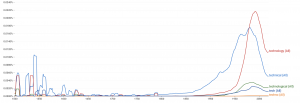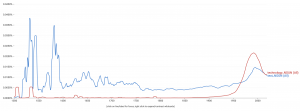What do the words “text” and “technology” mean to you?
Part 1. What is text? What is technology? How would you define these terms? (initial thoughts without consulting resources).
Text, as I use the term over the last few years, refers to a collection of characters that represent meaning. In my case it is usually Canadian English. In this way, my schema for information or language can be words, actions, thoughts, or text. I tend to add the suffix “book” when referring to a textbook, and find the word text referring to an entire book to be a bit old fashioned or stuffy – something nose-in-the-air academics say. It’s also a buzzword in pedagogy circles, when they refer to “different texts.”
I also use text as a verb meaning to send a message to someone through imessage or mms/sms. It’s quirky, but I don’t refer to WhatsApp or Facebook messages as texts, and definitely not email.
I think of Technology as referring to a tool created by an organism. Nothing created by a natural process counts as a technology, but any thing created by an organism that has a function does, whether it’s a crow using a stick to collect food, or a human made machine that can detect cancer. Additionally, technology usually constitutes an invention that makes some process easier, better, or accomplishes something new. I would consider the ability for ancient humans to produce pigments and create lasting cave art to be technology, but the art itself is not.
I recently listened to Ursula Frankin’s 1989 Massey Lecture on technology, in which she expanded the definition to include processes and systems as well – an individual artisan’s process would not constitute technology, but a formalized systematised process such as one that would be performed on an assembly line or to mass produce something (as opposed to art) constitutes technology. To me, this still fits my definition; even though there is no physical object to point at and call technological, the rote process is a human creation that can be taught and achieves a useful end.
Part 2. Words that might have been updated based on technological advancements.
Drive
Memory
Screen
Web
Phone!
Tab
Window
Cookies
Part 3. Notes from OED Definitions
I find it interesting that my own initial definition was correct, but that my assumption about the older and more recent usage was inverted: text as referring to words is the older and original meaning, while text as short for textbook is newer (1993 addition).
It was fascinating to learn that technology originally meant a treatise on art, but the first excerpt emphasizes that it is particularly human creation as opposed to words attributed to divine origin. Also interesting is that the word technology referred to subject terminology or “technical words” in the 1600s before actually coming to mean mechanical applied science in the 1700s. It makes perfect sense that it evolved in such a way.
Part 4. Ngrams


I can’t help but wonder if a large factor in the early use of “text” is due to errors in OCR and early pre-modern English script. I don’t see any patterns that seem enlightening. The word text has had consistent use while technology was comparatively unused until a recent surge. I tried breaking down different words with “tech” as their root and it was interesting that technical had been in use far earlier, presumably with the rise of industry.
Part 5. Conclusions
I think there’s a poetic beauty to text meaning woven, or the tissue of a literary work. It really paints a picture of the meaning of the words being greater than the sum of the characters that comprises them. Teche as in teaching is related to technology in the sense that technology is a human creation of applied science, and those processes can be conveyed to a learner.